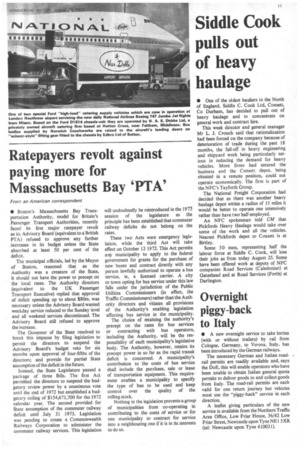Ratepayers revolt against paying more for Massachusetts Bay 'PTA'
Page 13

If you've noticed an error in this article please click here to report it so we can fix it.
From an American correspondent
• Boston's Massachusetts Bay Transportation Authority, model for Britain's Passenger Transport Authorities, recently faced its first major ratepayer revolt as its Advisory Board (equivalent to a British PTA) refused to approve any further increases in its budget unless the State absorbed at least 50 per cent of the deficit.
The municipal officials, led by the Mayor of Boston, reasoned that as the Authority was a creature of the State, it should not have the power to precept on the local rates. The Authority directors (equivalent to the UK Passenger Transport Executive) replied that approval of deficit spending up to about $80m. was necessary unless the Advisory Board wanted weekday service reduced to the Sunday level and all weekend services discontinued. The Advisory Board still refused to approve the increase.
The Governor of the State resolved to break this impasse by filing legislation to permit the directors to suspend the Advisory Board's budget veto for six months upon approval of four-fifths of the directors; and provide for partial State assumption of the deficit in the future.
Instead, the State Legislature passed a package of three Bills. The first Act permitted the directors to suspend the budgetary review power by a unanimous vote until the end of 1972 but established a budgetary ceiling of $154,671,700 for the 1972 calendar year. The second provided for State assumption of the commuter railway deficit until July 31 1973. Legislation was pending to create a Commonwealth Railways Corporation to administer the commuter railway services. This legislation will undoubtedly be reintroduced in the 1973 session of the legislature as the principle has been established that commuter railway deficits do not belong on the rates.
These two Acts were emergency legislation, while the third Act will take effect on October 13 1972. This Act permits any municipality to apply to the federal government for grants for the purchase of new buses and contract directly with any person lawfully authorized to operate a bus service, ie, a licensed carrier. A city or town opting for bus service under this law falls under the jurisdiction of the Public Utilities Commissioners (in effect, the Traffic Commissioners) rather than the Authority directors and vitiates all provisions of the Authority's enabling legislation affecting bus service in the municipality.
The choice of retaining the authority's precept on the rates for bus services or contracting with bus operators, including the Authority, will be the responsibility of each municipality's legislative body. The Authority, however, retains its precept power in so far as the rapid transit deficit is concerned. A municipality's contribution to the costs of bus service shall include the purchase, sale or lease of transportation equipment. This requirement enables a municipality to specify the type of bus to be used and keep control over the quality of the rolling stock.
Nothing in the legislation prevents a group of municipalities from co-operating in contributing to the costs of service or for one municipality to contract for service into a neighbouring one if it is in its interests to do so.




















































































